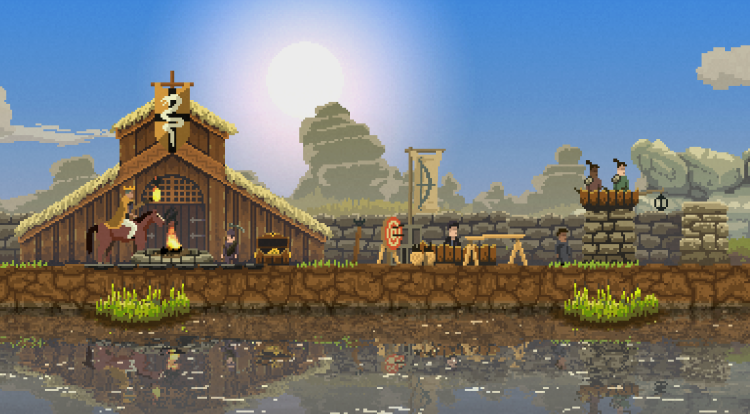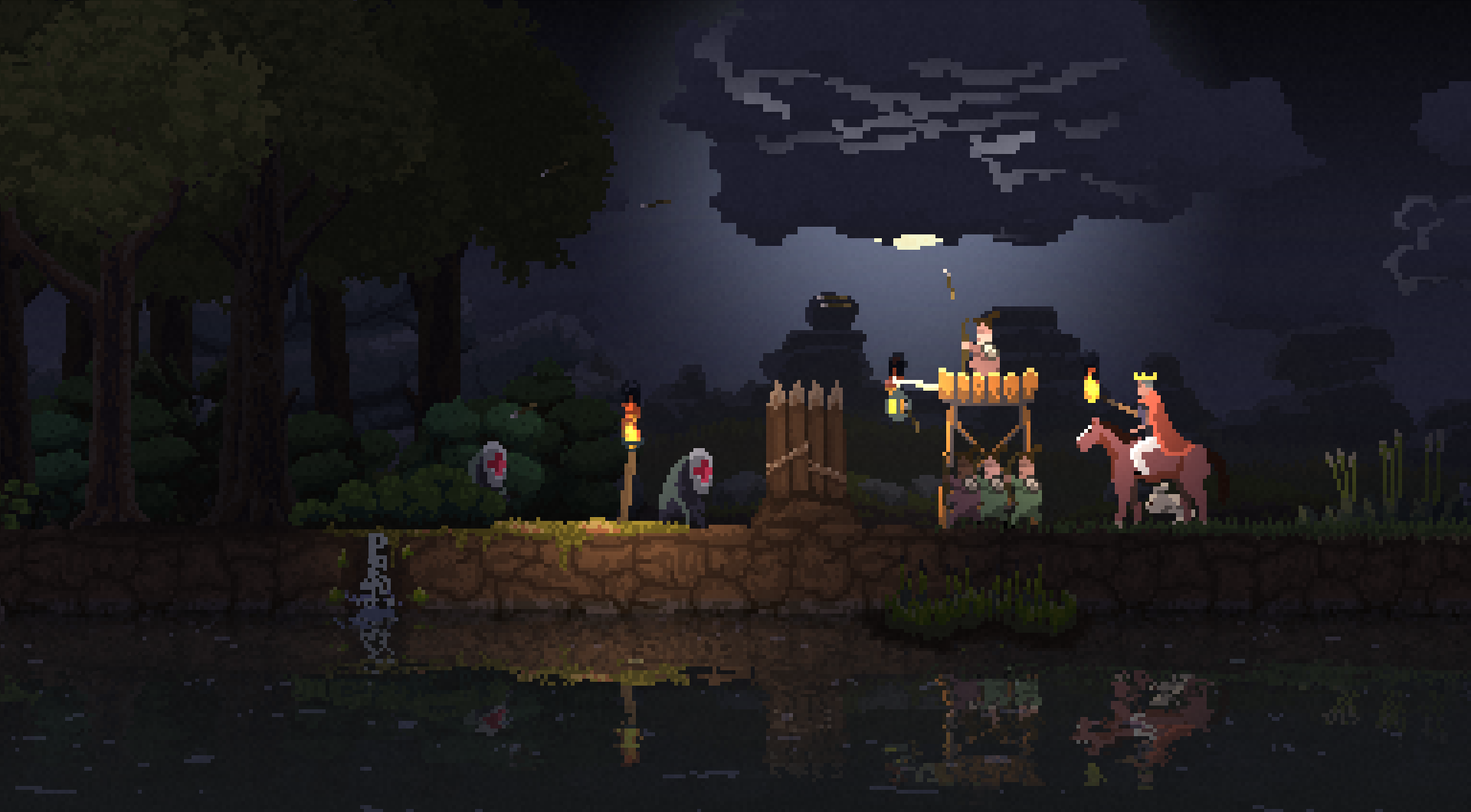Build. Expand. Defend.
Kingdom is a minimalist 2D strategy/resource-managing game. Developed by Noio (the Netherlands) and Licorice (Iceland) and published by Raw Fury, it starts with a brief intro explaining the basics. You are a randomly generated ruler (a king of queen, of varying skin tone) and are tasked with raising a kingdom from the ground. It gives you a handful of coins to hire workers and a few basic pointers, and then, it lets loose to rule as you will on PC, Mac, and Linux.
And then you build, expand, and defend.
Those three words sum up what Kingdom is trying to do and Nio and Licorice want players will do within their pixel art-stylized world. However, Kingdom is a little too minimalistic and bare-bones, and it’s a tad too caught up in its own simplicity. It’s an interesting idea, but the framework is at times at odds with the experimentation it so wants to flourish within its players.
Check out our Reviews Vault for past game reviews.
What you’ll like
A balancing act
The crux of Kingdom revolves around a balancing act. Everything requires you to spend coins, but only some things generate coins. As a player you have to figure out where to dedicate your resources. Do you buy a lot of archers and make a huge army? Or do you make strong defenses with a huge force of workers? It’s that balance that creates the creative tension that drives most of the game.
You have to balance survival with curiosity. The further away from your base you get, the more likely you are to be ambushed and lose your crown. But, you can also find more resources out in the forest surrounding your camp; more coins, statues, and other settlements that will – in ways unknown – lead to your victory (there is a victory state, but one the developer isn’t telling, and one I wasn’t able to find).
I also enjoyed the sense of progression and expansion you get as your stronghold grows each day. It may take time, but eventually you’ll feel like you have a little thriving kingdom under your thumb…at least until something comes and crushes it.
What you won’t like
Lackluster exploration
The focus on exploration suffers because of the slow movement across the 2D world. Villagers are slow, your horse is slow, and getting from place to place is slow. Everything about Kingdom is a slow, methodical burn, which isn’t by itself a bad thing. Your horse can sprint — for a brief time — before needing to go back again to walking slow. This is especially problematic when trying to escape from the enemies that are attacking your kingdom and trying to steal your gold.
It also really hampers exploration: When it takes a long time to make it from your base to parts of the forest and back, I’m less likely to dedicate much time to exploration. You can only explore so far, which while keeping the game’s scope in check also seems a little artificial. Exploration calls for more variation, more space to explore in, and a faster way to do it.
This problem only snowballs as your camp gets bigger. It gets harder and harder to keep track of what is going on. Enemies could be demolishing one side of your camp without any indication or alert.
Two-dimensional problems
Kingdom, even as a side-scrolling 2D game, really at times feels like a real-time strategy game, but without any of the advantages that its top-down viewpoint cousins have. The larger your kingdom becomes, the harder it is to quickly negative it and keep track of everything. It would be like playing Age of Empires as a character on the ground floor, instead of the all important overhead view given to games like it and The Sims.
Even something as simple like collecting your gold each day becomes a task. You must hunt all over your kingdom to find which of your servants happen to have gold to give you on any given day. Some type of auto-collecting feature would have gone a long way here to streamline this, especially given how important gold is.
It also has no way to call your villagers back in at night (though sometimes they seemed to get the idea to do it on their own) or to have them prioritize or switch tasks. It lacks a master list of how many of each type of worker you have or any notice when a task is completed. The attempts to keep it simple become problematic here, and you need to be able to do more than the game lets you do, and the design limitation are real negatives.
It’s also problematic that — especially when in the forest and outside of your camp — the game really doesn’t give you any sense of time passing. When night can often spell doom for your entire kingdom, it seems an odd to not warn you that night is coming and that you need to get back to camp. The sun does pass in the background, which gives some indication, but the forest is always dark, meaning you could have no idea that it’s night and the raids have started while you are out exploring.
A new game is just like the old game
The large investment of starting over is a detriment to Kingdom’s replayability, which largely depends on your patience with starting everything up completely over. How much you’ll get out of the experience depends on how likely you are to replay similar parts, and the idea of learning from each attempt is hindered by having to go so far back to test new ideas. The start of the game is pretty slow-moving, and that’s the part you’ll have to keep playing over and over again when you die. Each instance also felt too similar to the one before it, and the game starts to get boring, going through the same motions every time. Even the pixel filter became distracting; it moves with the screen like an overlay, breaking the effect that its going for.
Kingdom also suffers because every instance ends up being, feeling, and looking too similar — despite being procedurally generated. A few different landmarks swap positions. Each new instance felt more like a variant on a theme than a whole new world to explore, and the forest lost its appeal on each play through. I also wish that Kingdom would let you start over from a day you previously failed on, instead of having to go back all the way to day one every time you died. It would make it a bit easier, but also allow for the types of risky exploration it seems to want to foster.
No carrot for the horse
Kingdom lacks a central driving force to keep players playing. It doesn’t have enough to coax you to keep playing. It relies on a player’s own self-feedback loop and desire to explore. But without a limitation on exploring, this doesn’t work.
Achievements are on their way, and these may address this problem (if achievements are your thing). But there still needs to be something in-game to motivate you. If it has no point or motivating factor, it’s hard to stay motivated.
Conclusion
Kingdom has solid ideas that get lost in its own simplicity. It’s a little too conceptual, and I found that it had a hard time holding my attention after a few in-game days. It has a whole kingdom out there to explore, but it just isn’t varied or interesting enough to warrant the type of commitment it ask of the player.
Score: 67/100
Kingdom is now available for PC, Mac, and Linux. The publisher provided GamesBeat with a code for the purposes of this review.
VentureBeat's mission is to be a digital town square for technical decision-makers to gain knowledge about transformative enterprise technology and transact. Learn More


